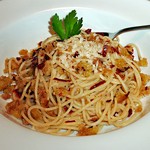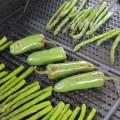Earlier this week we introduced you to peperoni cruschi. Now the exploration continues. From friends in Maierà – where the famous Peperoncino Museum is located – we were invited to a restaurant where those crispy peppers were just one of many delicious appetizers. Since we were so enthusiastic about them, our friends gave us a treccia of dried Dolce Calabrese so that we could fix those crispy peppers back home.
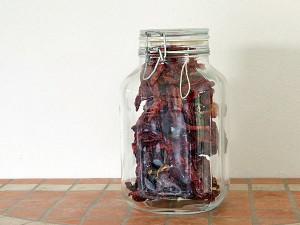
Airtight storage of a pepper ristra in northern latitudes
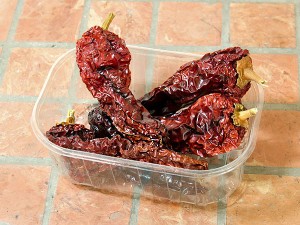
Raw material: Our dried hot peppers from the above ristra
The frying takes just a few seconds: Dip the peppers into the simmering olive oil, count 1-2-3, turn them, 1-2-3 – done! We recommend frying them one by one.
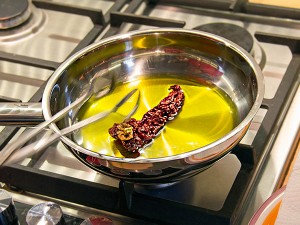
Frying the dried peppers
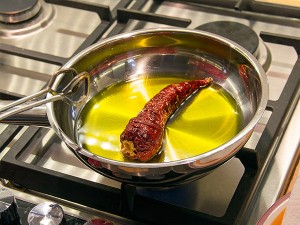
The dried peppers will inflate during frying
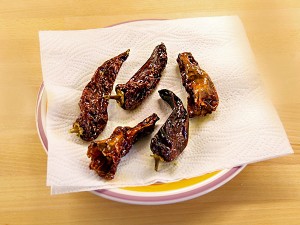
Draining off oil on kitchen paper towels
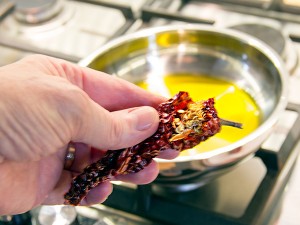
Optionally, you can break off the stem and remove the seeds before frying
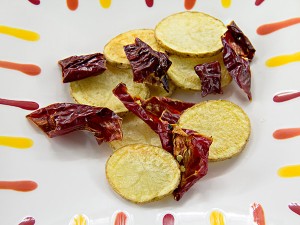
Fried Italian sweet peppers fried potato slices
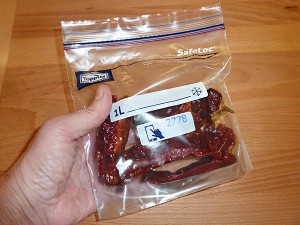
Keeping Peperoni Cruschi airtight
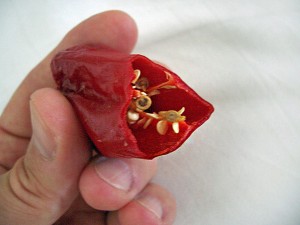
Cross section of Peperone di Senise – other thin-fleshed varieties are also suitable
In addition to Peperoni di Senise or Dolce Calabrese, other sweet pepper varieties can be fried into peperoni cruschi, such as Hungarian spicy peppers or New Mexican chiles (generic term “Hatch Chiles”) such as Sandia, NuMex Heritage 6-4 or NuMex Big Jim. The pods should be thin-fleshed, matured to red (or different colors depending on the variety), and dried well. In northern latitudes that requires most of the time the use of an electric dehydrator, otherwise harmful mold quickly forms in whole fruits – Northern Europe (and not even northern Italy) or the northern United States are just not Calabria, Basilicata, Apulia, or New Mexico.
Commercial Peperoni Cruschi Products
If you’re not into frying your own peppers, you can buy the crispy Kruskis already fried and sealed airtight as a finished product. For example, a search on amazon.it for peperoni + cruschi resulted in a large number of such products. Attention: There are also suppliers in the Basilicata offering “Peperoni Cruschi” for frying at home (labeled “da friggere”). They still have to go to the frying pan. You can usually recognize them by the packaging of transparent plastic bags – just dried peppers.
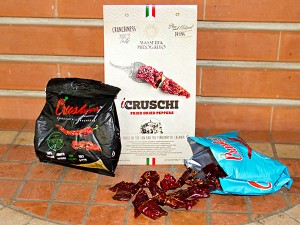
Commercial Peperoni Cruschi Products
We liked all three products and – like chips – there’s a certain risk of addiction. If you want to use them in other dishes (including sweet ones), the oven-baked Cruskees are recommended because they don’t contain salt. The other two are great in pasta dishes, for example; here you should be careful with additional salt.
If you’d like to try the famous Peperoni di Senise and the dishes prepared with them on location, a trip to the beautiful Basilicata region is recommended. Some areas there are strongly reminiscent of the southwestern United States; others appear truly Mediterranean, with countless old olive trees.
At harvest time starting in August, the red fruits are shining from the fields. There are not too many accommodations in this part of the Basilicata, which is not (yet) much developed for tourism. Therefore be advised to turn check out tour guides in time. While there, you should also take a look at Matera, European Capital of Culture in 2019. Culinary, the versatile region offers a full-bodied red wine called Aglianico del Vulture, tasty dried beans (Fagioli di Sarconi), as well as bread, sausage and cheese specialties. And of course those famous Peperoni di Senise…
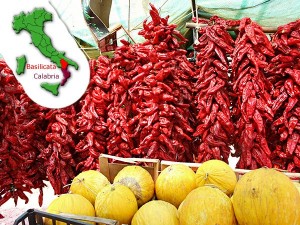
Basilicata and Calabria – a worthwhile destination for pepper lovers
In addition to the mild Dolce Calabrese, there are also hot chile peppers at the tip of Italy. Their Scoville values does not come close to the record holders, but they have good fire and the typical peperoncino flavor of the region. There are many local products made with those pepperoncini, often called “Diavolini” or “Viagra dei poveri” (poor man’s Viagra).
But first, have fun trying those fantastic Peperoni Cruschi and enjoy!
- Thoroughly crumble the white bread.
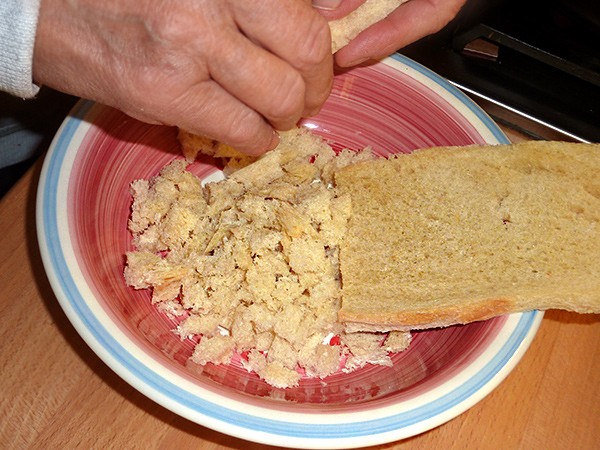
- Crumble the peperoni also. A plastic bag is helpful here.
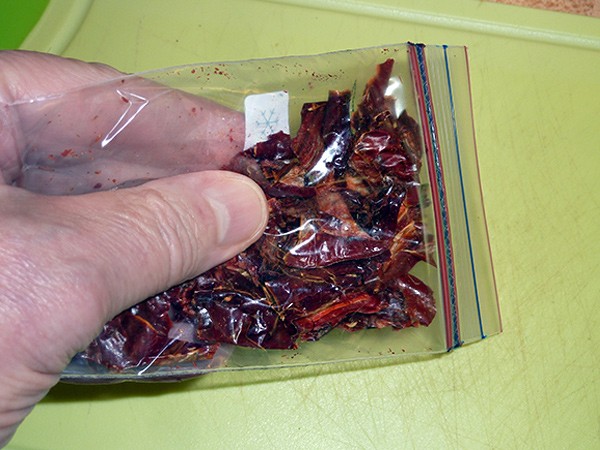
- Heat the oil in a large frying pan on medium heat, then flavorize it with the garlic clove for about 5 minutes.
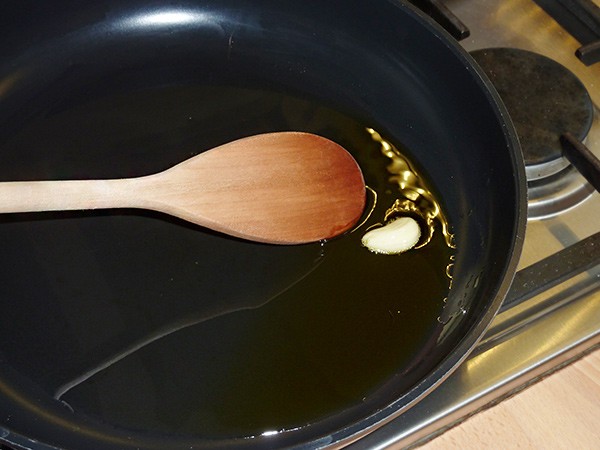
- Add the crumbled bread and toast until golden brown, stirring constantly. Remove the toasted bread crumbs, set aside (discard the garlic). Pour some more oil into the pan if necessary.
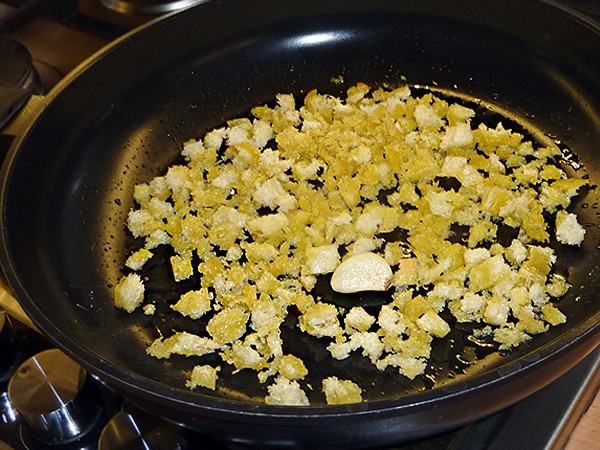
- Meanwhile, cook the spaghetti al dente in plenty of salted water, according to the instructions. Then drain, but retain some of the pasta water.
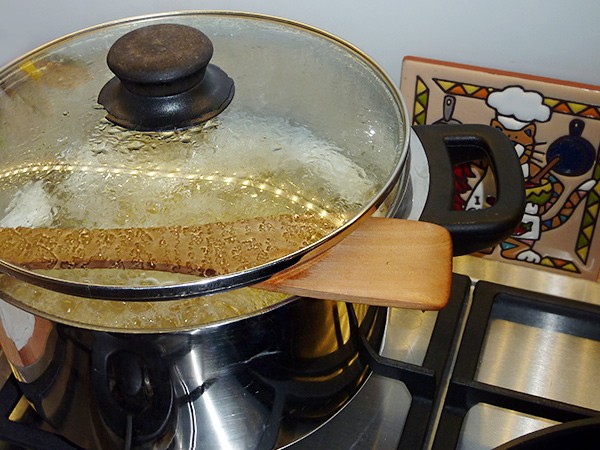
- Add one (or two) ladles of pasta cooking water to the oil in the pan, stir well and reheat on low heat.
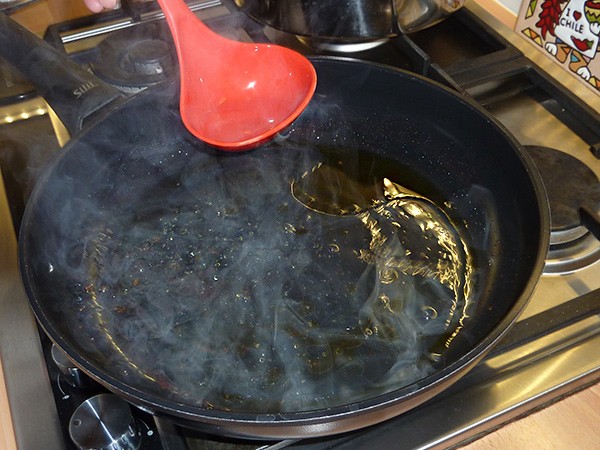
- Pour the drained spaghetti into the pan.
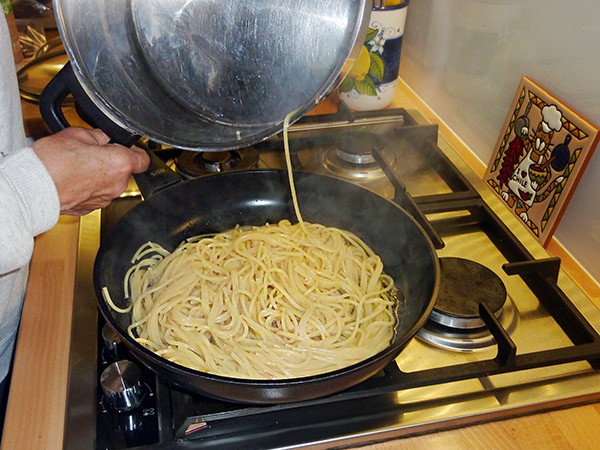
- Add the roasted bread crumbs as well as the crushed Peperoni Cruschi.
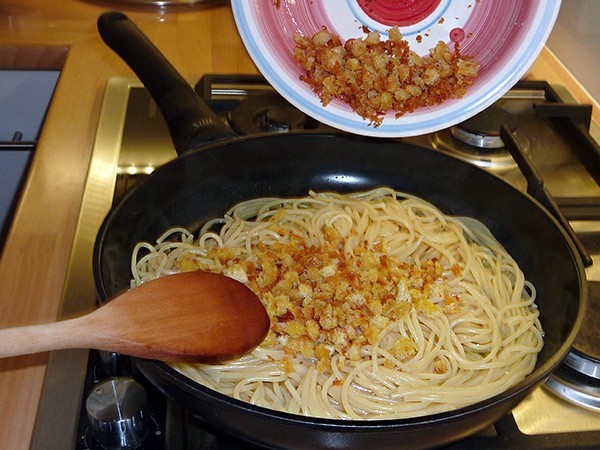
- Mix everything well, arrange on preheated plates and, if desired, sprinkle with the grated Parmigiano. Buon appetito!
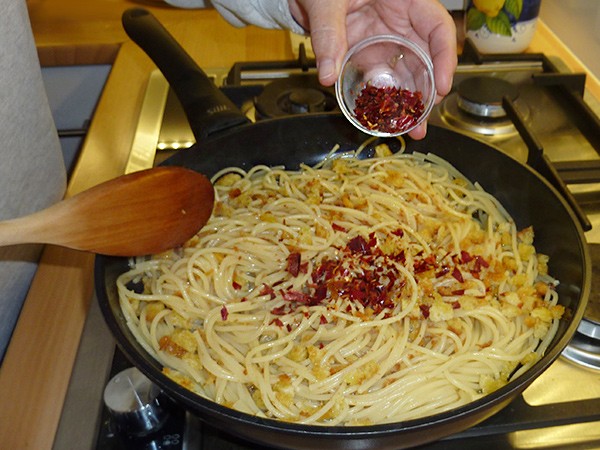
Peperoni Cruschi are available online, or you can make them yourself. If you like it a little spicier, you can also heat a hot chile pepper along with the garlic clove.
Latest posts by Harald Zoschke (see all)
- Peperoni Cruschi Part 2 | Frying Them Up - 01/02/2020
- Spaghetti con Peperoni Cruschi - 01/02/2020
- Peperoni Cruschi | Crunchy Treat for Pepper Lovers - 12/31/2019








